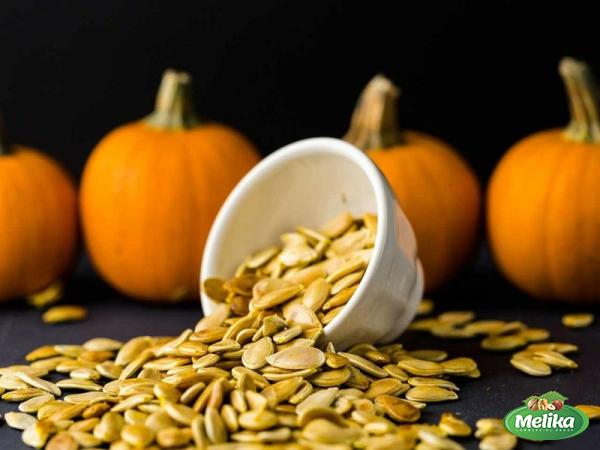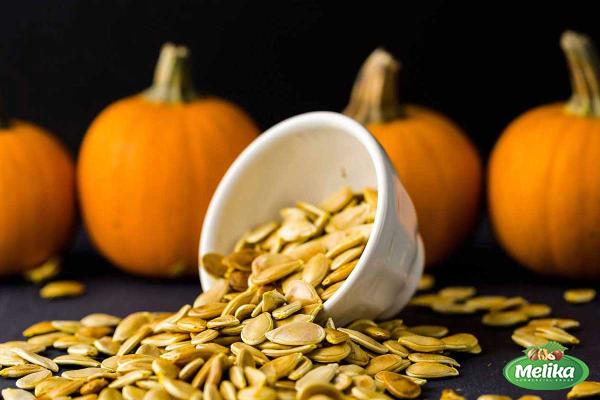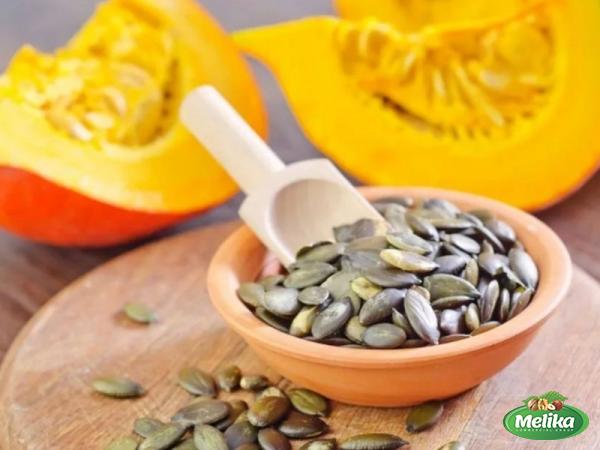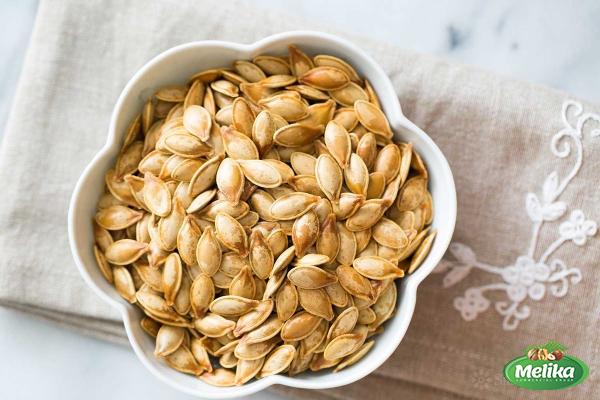Edible pumpkin seeds, also known as pepitas, have gained significant popularity in recent years due to their nutritional value and culinary applications. Pumpkin seeds are not only delicious but also packed with essential nutrients, making them a healthy snack option. This article aims to explore the purchase price of edible pumpkin seeds, along with their properties, advantages, and disadvantages. Properties of Edible Pumpkin Seeds: 1. Nutritional Profile: Pumpkin seeds are a rich source of various nutrients, including protein, healthy fats, fiber, vitamins (such as vitamin E), and minerals (such as magnesium, potassium, and zinc). They also contain antioxidants, which help in fighting against free radicals and reduce the risk of chronic diseases. 2. Culinary Versatility: Edible pumpkin seeds have a pleasant nutty flavor and can be enjoyed in various ways. They can be consumed raw, roasted, or incorporated into a variety of recipes, such as salads, soups, granola bars, and baked goods. Additionally, they can be ground into a powder to use as an ingredient in sauces, dressings, and spreads. 3. Long Shelf Life: Pumpkin seeds have a relatively long shelf life if stored properly. They can be stored in an airtight container in a cool, dry place for several months without losing their taste and nutritional value, making them a convenient pantry staple. Advantages of Edible Pumpkin Seeds: 1. Nutrient-Dense Superfood: Pumpkin seeds are considered a superfood due to their exceptional nutritional profile. They are an excellent source of plant-based protein, making them a suitable option for vegetarian and vegan diets. They also contain heart-healthy monounsaturated and polyunsaturated fats, which can help in reducing bad cholesterol levels and improving heart health. 2. Rich in Powerful Antioxidants: Pumpkin seeds are abundant in antioxidants, such as vitamin E and carotenoids, which help neutralize harmful free radicals in the body. These antioxidants contribute to reducing inflammation, strengthening the immune system, and protecting against chronic diseases like cancer and cardiovascular conditions. 3. Mineral-Rich for Bone Health: Pumpkin seeds are packed with essential minerals like magnesium, potassium, and zinc.

nuts
 Magnesium promotes bone health, potassium helps maintain blood pressure levels, and zinc plays a crucial role in immune function and wound healing. 4. Supportive to Prostate Health: Some studies suggest that the phytosterols found in pumpkin seeds may have a positive impact on prostate health. These compounds have been associated with a reduced risk of benign prostatic hyperplasia (BPH) and may help alleviate symptoms such as urinary difficulties. Disadvantages of Edible Pumpkin Seeds: 1. High Calorie Content: While pumpkin seeds are a nutritious snack, they can be high in calories. This means that excessive consumption can lead to weight gain if not accounted for within a balanced diet. Portion control is recommended, especially for individuals watching their calorie intake. 2. Possible Allergic Reactions: Although rare, some individuals may have allergies or sensitivities to pumpkin seeds. Allergic reactions can vary from mild symptoms, such as itching and hives, to more severe reactions like difficulty breathing. It is crucial to seek medical advice if any allergic reactions occur. 3. Cost Considerations: The purchase price of edible pumpkin seeds can vary depending on various factors such as brand, quality, and quantity. Compared to other snack options, pumpkin seeds can be relatively expensive, especially if buying organic or premium varieties. This may make them less accessible to individuals on a tight budget. Conclusion: Edible pumpkin seeds offer a range of health benefits and culinary versatility, making them an appealing addition to any diet. With their excellent nutritional profile, rich antioxidant content, and versatile uses, they have earned their reputation as a superfood. However, it is important to consider the potential disadvantages, such as the high calorie content and cost implications. As with any food, moderation and budget considerations should be taken into account. Overall, the purchase price of edible pumpkin seeds is outweighed by their numerous advantages and the potential they hold for enhancing both taste and nutrition in a variety of recipes. The Purchase Price of Edible Pumpkin Seeds: Properties, Advantages, and Disadvantages I. Introduction Edible pumpkin seeds, or pepitas, have experienced a surge in popularity due to their nutritional value and versatility in culinary applications. In this article, we will delve into the purchase price of edible pumpkin seeds, exploring their properties, advantages, and disadvantages in detail. II. The Properties of Edible Pumpkin Seeds Edible pumpkin seeds possess several enticing properties that make them a sought-after ingredient in the culinary world: A. Nutritional Profile: Pumpkin seeds are an excellent source of protein, healthy fats, fiber, vitamins (such as vitamin E), and minerals (including magnesium, potassium, and zinc). These nutrients contribute to overall well-being and can be especially beneficial for individuals following a plant-based diet. B. Culinary Versatility: The nutty flavor and crunchy texture of edible pumpkin seeds make them a versatile ingredient. They can be enjoyed on their own as a snack, used as a topping for salads or granola, incorporated into baked goods, or ground into a powder for use in sauces and spreads. C. Long Shelf Life: Edible pumpkin seeds have a relatively long shelf life when stored properly.
Magnesium promotes bone health, potassium helps maintain blood pressure levels, and zinc plays a crucial role in immune function and wound healing. 4. Supportive to Prostate Health: Some studies suggest that the phytosterols found in pumpkin seeds may have a positive impact on prostate health. These compounds have been associated with a reduced risk of benign prostatic hyperplasia (BPH) and may help alleviate symptoms such as urinary difficulties. Disadvantages of Edible Pumpkin Seeds: 1. High Calorie Content: While pumpkin seeds are a nutritious snack, they can be high in calories. This means that excessive consumption can lead to weight gain if not accounted for within a balanced diet. Portion control is recommended, especially for individuals watching their calorie intake. 2. Possible Allergic Reactions: Although rare, some individuals may have allergies or sensitivities to pumpkin seeds. Allergic reactions can vary from mild symptoms, such as itching and hives, to more severe reactions like difficulty breathing. It is crucial to seek medical advice if any allergic reactions occur. 3. Cost Considerations: The purchase price of edible pumpkin seeds can vary depending on various factors such as brand, quality, and quantity. Compared to other snack options, pumpkin seeds can be relatively expensive, especially if buying organic or premium varieties. This may make them less accessible to individuals on a tight budget. Conclusion: Edible pumpkin seeds offer a range of health benefits and culinary versatility, making them an appealing addition to any diet. With their excellent nutritional profile, rich antioxidant content, and versatile uses, they have earned their reputation as a superfood. However, it is important to consider the potential disadvantages, such as the high calorie content and cost implications. As with any food, moderation and budget considerations should be taken into account. Overall, the purchase price of edible pumpkin seeds is outweighed by their numerous advantages and the potential they hold for enhancing both taste and nutrition in a variety of recipes. The Purchase Price of Edible Pumpkin Seeds: Properties, Advantages, and Disadvantages I. Introduction Edible pumpkin seeds, or pepitas, have experienced a surge in popularity due to their nutritional value and versatility in culinary applications. In this article, we will delve into the purchase price of edible pumpkin seeds, exploring their properties, advantages, and disadvantages in detail. II. The Properties of Edible Pumpkin Seeds Edible pumpkin seeds possess several enticing properties that make them a sought-after ingredient in the culinary world: A. Nutritional Profile: Pumpkin seeds are an excellent source of protein, healthy fats, fiber, vitamins (such as vitamin E), and minerals (including magnesium, potassium, and zinc). These nutrients contribute to overall well-being and can be especially beneficial for individuals following a plant-based diet. B. Culinary Versatility: The nutty flavor and crunchy texture of edible pumpkin seeds make them a versatile ingredient. They can be enjoyed on their own as a snack, used as a topping for salads or granola, incorporated into baked goods, or ground into a powder for use in sauces and spreads. C. Long Shelf Life: Edible pumpkin seeds have a relatively long shelf life when stored properly.
Specifications of nuts
 By keeping them in an airtight container in a cool, dry place, they can maintain their taste and nutritional value for several months, making them a convenient pantry staple. III. The Advantages of Edible Pumpkin Seeds Edible pumpkin seeds offer numerous advantages that contribute to their growing popularity: A. Nutrient-Dense Superfood: With their impressive nutritional profile, pumpkin seeds are considered a superfood. They provide a rich source of plant-based protein, making them an ideal option for those looking to increase their protein intake. Additionally, the presence of heart-healthy monounsaturated and polyunsaturated fats can promote cardiovascular health. B. Rich in Powerful Antioxidants: Pumpkin seeds are abundant in antioxidants like vitamin E and carotenoids. These compounds help combat free radicals in the body, reducing inflammation and supporting a healthy immune system. Their antioxidant properties also offer protection against chronic diseases, such as cancer and cardiovascular conditions. C. Beneficial for Bone Health: The high mineral content in pumpkin seeds, including magnesium, potassium, and zinc, contributes to bone health. Magnesium aids in the absorption of calcium, while potassium helps maintain optimal bone density. Zinc plays a crucial role in bone formation and healing processes. D. Supportive to Prostate Health: Some studies suggest that the phytosterols found in pumpkin seeds may benefit prostate health. These natural compounds have been associated with a reduced risk of benign prostatic hyperplasia (BPH), a common condition among older men. Regular consumption of pumpkin seeds may help alleviate symptoms and promote overall prostate health. IV. The Disadvantages of Edible Pumpkin Seeds While edible pumpkin seeds offer numerous advantages, it is essential to consider potential drawbacks: A. High Calorie Content: Pumpkin seeds are relatively calorie-dense, which means excess consumption can contribute to weight gain. It’s crucial to monitor portion sizes and incorporate them within a balanced diet to avoid exceeding daily calorie requirements. B. Possible Allergic Reactions: While rare, some individuals may be allergic to pumpkin seeds. Allergy symptoms can range from mild itching or hives to more severe reactions, including difficulty breathing. It is important to consult a medical professional if any allergic reactions occur. C. Cost Considerations: When assessing the purchase price of edible pumpkin seeds, it’s worth mentioning that they can be relatively expensive compared to other snack options, particularly when considering organic or premium varieties. The higher cost may be a barrier for individuals on a tight budget.
By keeping them in an airtight container in a cool, dry place, they can maintain their taste and nutritional value for several months, making them a convenient pantry staple. III. The Advantages of Edible Pumpkin Seeds Edible pumpkin seeds offer numerous advantages that contribute to their growing popularity: A. Nutrient-Dense Superfood: With their impressive nutritional profile, pumpkin seeds are considered a superfood. They provide a rich source of plant-based protein, making them an ideal option for those looking to increase their protein intake. Additionally, the presence of heart-healthy monounsaturated and polyunsaturated fats can promote cardiovascular health. B. Rich in Powerful Antioxidants: Pumpkin seeds are abundant in antioxidants like vitamin E and carotenoids. These compounds help combat free radicals in the body, reducing inflammation and supporting a healthy immune system. Their antioxidant properties also offer protection against chronic diseases, such as cancer and cardiovascular conditions. C. Beneficial for Bone Health: The high mineral content in pumpkin seeds, including magnesium, potassium, and zinc, contributes to bone health. Magnesium aids in the absorption of calcium, while potassium helps maintain optimal bone density. Zinc plays a crucial role in bone formation and healing processes. D. Supportive to Prostate Health: Some studies suggest that the phytosterols found in pumpkin seeds may benefit prostate health. These natural compounds have been associated with a reduced risk of benign prostatic hyperplasia (BPH), a common condition among older men. Regular consumption of pumpkin seeds may help alleviate symptoms and promote overall prostate health. IV. The Disadvantages of Edible Pumpkin Seeds While edible pumpkin seeds offer numerous advantages, it is essential to consider potential drawbacks: A. High Calorie Content: Pumpkin seeds are relatively calorie-dense, which means excess consumption can contribute to weight gain. It’s crucial to monitor portion sizes and incorporate them within a balanced diet to avoid exceeding daily calorie requirements. B. Possible Allergic Reactions: While rare, some individuals may be allergic to pumpkin seeds. Allergy symptoms can range from mild itching or hives to more severe reactions, including difficulty breathing. It is important to consult a medical professional if any allergic reactions occur. C. Cost Considerations: When assessing the purchase price of edible pumpkin seeds, it’s worth mentioning that they can be relatively expensive compared to other snack options, particularly when considering organic or premium varieties. The higher cost may be a barrier for individuals on a tight budget.
buy nuts
 V. Culinary Applications and Recipe Inspiration Edible pumpkin seeds can be used in a variety of recipes and culinary creations. Here are a few ideas to inspire you: A. Snack on Roasted Pumpkin Seeds: After removing the pumpkin seeds from the pumpkin, rinse them, toss them with olive oil and seasonings of your choice (such as salt, pepper, or spices), and roast them in the oven until crispy. Enjoy them as a standalone snack or incorporate them into trail mix for an added crunch. B. Add Crunch to Salads: Sprinkle roasted pumpkin seeds over salads to give them a satisfying crunch and nutty flavor. They pair especially well with leafy greens, roasted vegetables, and creamy dressings. C. Incorporate into Baked Goods: Mix pumpkin seeds into bread dough, muffin batter, or granola bars for added texture and nutritional benefits. They can also be pressed onto the top of bread loaves or cookies for an attractive garnish. D. Create Pumpkin Seed Butter: Grind roasted pumpkin seeds into a fine powder and blend them with a bit of oil and a pinch of salt to make your own pumpkin seed butter. Spread it on toast, use it as a dip, or incorporate it into savory sauces for a unique twist. VI. Where to Purchase Edible Pumpkin Seeds Edible pumpkin seeds are widely available in various forms and can be found in most grocery stores or specialty food shops. They can be purchased in bulk, pre-packaged, raw, salted, roasted, or even flavored. Options for purchasing online also abound, providing customers with a wide range of choices and opportunities to compare prices. Conclusion The purchase price of edible pumpkin seeds is justified by their remarkable properties, advantages, and culinary versatility. With their abundant nutritional value, including protein, healthy fats, and vital minerals, pumpkin seeds offer a wide range of health benefits. However, it is important to consider potential drawbacks such as high-calorie content and cost considerations. By incorporating edible pumpkin seeds into a well-balanced diet and using them creatively in various recipes, individuals can enjoy the taste, nutritional benefits, and versatility they bring to the table.
V. Culinary Applications and Recipe Inspiration Edible pumpkin seeds can be used in a variety of recipes and culinary creations. Here are a few ideas to inspire you: A. Snack on Roasted Pumpkin Seeds: After removing the pumpkin seeds from the pumpkin, rinse them, toss them with olive oil and seasonings of your choice (such as salt, pepper, or spices), and roast them in the oven until crispy. Enjoy them as a standalone snack or incorporate them into trail mix for an added crunch. B. Add Crunch to Salads: Sprinkle roasted pumpkin seeds over salads to give them a satisfying crunch and nutty flavor. They pair especially well with leafy greens, roasted vegetables, and creamy dressings. C. Incorporate into Baked Goods: Mix pumpkin seeds into bread dough, muffin batter, or granola bars for added texture and nutritional benefits. They can also be pressed onto the top of bread loaves or cookies for an attractive garnish. D. Create Pumpkin Seed Butter: Grind roasted pumpkin seeds into a fine powder and blend them with a bit of oil and a pinch of salt to make your own pumpkin seed butter. Spread it on toast, use it as a dip, or incorporate it into savory sauces for a unique twist. VI. Where to Purchase Edible Pumpkin Seeds Edible pumpkin seeds are widely available in various forms and can be found in most grocery stores or specialty food shops. They can be purchased in bulk, pre-packaged, raw, salted, roasted, or even flavored. Options for purchasing online also abound, providing customers with a wide range of choices and opportunities to compare prices. Conclusion The purchase price of edible pumpkin seeds is justified by their remarkable properties, advantages, and culinary versatility. With their abundant nutritional value, including protein, healthy fats, and vital minerals, pumpkin seeds offer a wide range of health benefits. However, it is important to consider potential drawbacks such as high-calorie content and cost considerations. By incorporating edible pumpkin seeds into a well-balanced diet and using them creatively in various recipes, individuals can enjoy the taste, nutritional benefits, and versatility they bring to the table.











Your comment submitted.